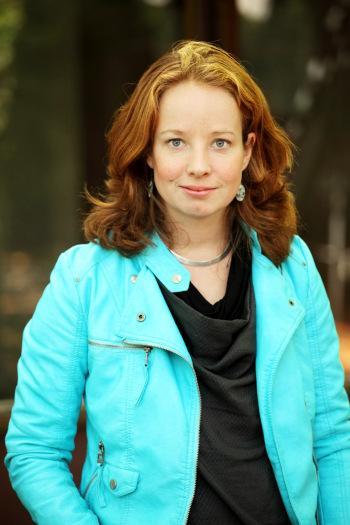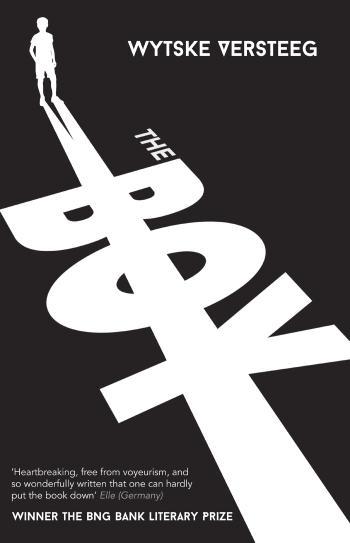 Today’s guest and her novel represent things I believe in and want to support on the Literary Sofa. Wytske Versteeg is a Dutch author, whose third novel The Boy has recently been translated into English by Sarah Welling and released in the UK by small independent HopeRoad Publishing. The Boy made it into my new quarterly Sofa Spotlight for Winter 2016 on its own distinctive merits – you can find out more in my review at the end of this post. But for now, I’d like to welcome Wytske, only the fourth guest to appear on the blog writing in a second language (not that you’d know it), and about a subject which arouses strong feelings – motherhood:
Today’s guest and her novel represent things I believe in and want to support on the Literary Sofa. Wytske Versteeg is a Dutch author, whose third novel The Boy has recently been translated into English by Sarah Welling and released in the UK by small independent HopeRoad Publishing. The Boy made it into my new quarterly Sofa Spotlight for Winter 2016 on its own distinctive merits – you can find out more in my review at the end of this post. But for now, I’d like to welcome Wytske, only the fourth guest to appear on the blog writing in a second language (not that you’d know it), and about a subject which arouses strong feelings – motherhood:
‘Such a horrible woman’, was the first reaction of my editor when I handed in the manuscript of The Boy. A writer always loves her characters who are, after all, more often than not some distortion or extrapolation of her own personality; a version that could have been, had circumstances been different. So I was slightly hurt by my editor’s remark, and by the many comments that would follow after The Boy had been published. ‘A mother like this cannot exist for real’, some reviewers wrote.
As a writer, I am particularly attracted to the inconvenient stories – stories that are not told as often, that are difficult to hear, that do not fit within the framework of ‘buy this/do this, then happiness will come your way’, on which so much of our society is built. Yet it was only after The Boy had been published that I fully realized how inconvenient this particular story was, how much of a taboo still surrounded imperfect motherhood. We all know how difficult and even dangerous family life can be, if not from our own experience than from looking around or even just from the stories that we read in the newspapers. Yet it still seems impossible to talk about this.
I don’t have children myself and as a consequence, parenthood is something that I will never fully understand. I would probably never have written The Boy, had I known beforehand that the loss of a child would be its central theme – I would not have dared. But I never know beforehand what my novels will be about and this story developed only as I was already writing the book. I started out with a completely different question: what happens when you allow someone to get close, who really can’t be trusted? Yet while I was developing this theme, the mother emerged ever more strongly– she had an angry voice, embittered. But one that made me curious: what had happened to this woman, to have shaped her this way?
The mother in my novel – she does not have a name – is no monster. Indeed, it is by trying to be the best mother she can possibly be, that she damages her child.
She has been hurt herself, that much is clear. She is unable to conceive and feels betrayed by her own body, humiliated by the procedures that precede the adoption of a child. But once the child is there, she feels unable to communicate her love for him. She tries to protect him against the world, to make him less vulnerable. By doing so, she hurts him all the more. She is a psychiatrist, a professional in the world of emotions, she encourages her patients to open up to her. She hides behind a mask. When her child disappears, when his body is found – this is not a spoiler, but the start of the book – she is helpless.
She has always focused on trying to control her world; now that something beyond control has happened, her world is shattered. She can no longer do her job, she finds herself unable to wear her mask in any convincing way. Isolated by her grief, she travels to Bulgaria in an attempt to find out what happened to her son. His former teacher has moved to a small village on the Bulgarian countryside and now lives off the grid. As the women get closer to one another, the mother gradually learns that there is much she does not know about her child; much that she has never wanted to know. While learning, too late, about his loneliness and his vulnerabilities, she can slowly allow herself to become more human, too. When her son was still alive, she had been unable to show herself in any meaningful way and, therefore, to see him: she had been protecting an image, the perfect mother she could never be.
The Boy encouraged people to share their stories with me, much more than any of my other books. I encountered people who had experienced the loss of a child. I spoke to people who had adopted children, or who had been adopted themselves. These conversations left me both grateful and embarrassed. I have a way with words on paper, but not necessarily on the spot, and so I have just tried to listen as these people spoke to me, as well as I could.
One of the stories that particularly impressed me was that of a man who had been fostered as a child. Raised in a small Austrian village, he was the eternal outsider; the only one who did not really belong to a family. When he had already grown up and left the village, his mother tried to kill both herself and his foster brother, her biological child. She survived; the boy did not. The man I encountered had sad eyes and a soft voice, he said: ‘We meet sometimes for coffee. We never talked about what happened.’
In thanking Wytske for this sensitive piece in beautiful English, I’m going to repeat my response on first reading it : it’s as powerful as the book, and that’s saying something! Are you tempted by this one?
If you missed it in the summer, you might be interested in my guest post on Women and Motherhood for Naomi Frisby’s blog The Writes of Woman.

This fearless and uncompromising portrait of troubled attachment and maternal grief made a profound impact on me. It challenges the reader on many levels and parts of it are very upsetting, but it was worth it. I’d like to see more ‘inconvenient stories’ published – it’s so exciting to discover a book that dares to tread on this kind of territory. Described as a ‘psychological thriller’, it had a completely different feel to typical novels of that genre, despite centring on the mother’s state of mind and being what I call ‘disruptively compelling’, making me abandon what I was supposed to be doing. Here nothing is ‘amped up’ – in fact, events are relayed in a stark, almost forensic style which increases the power, but also the distance which often accompanies an unnamed character. And yet this book – written with more empathy than the reader will necessarily feel – provokes a strong emotional response. I felt desperately sorry for everyone involved but I also found myself judging the protagonist, which is an uncomfortable situation, especially when it involves motherhood. She exists in other dimensions too, as a wife and a psychiatrist (I found her attitude to her patients deeply worrying), and is in essence a tragic figure. Despite its brevity, The Boy raises so many complex issues that it really warrants an in-depth review and would be a great one to discuss. I won’t forget it in a hurry.
*POSTSCRIPT*
It’s been a busy time on the Sofa with a lot of interest in the last two posts: Saleem Haddad’s Shelving the ‘Gay Novel’ and my write-up of Good Sex Night, an event which surpassed its stated remit to touch on definitions of literary fiction and the issue of cultural appropriation. Thanks to everyone who’s read, shared and commented!
Next week, in my final post before the Christmas break, I’ll be revealing the titles that have impressed me most in 2016 – My Year in Books. One of my favorite ones to write!

